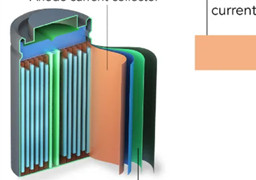ьДыЄ ь ъИАь ьД ьИьь ъЗЙь ьМыЁ ыГэьэЌъЙ? ьИъГ ьЕъГ ь ьАъЕЌььь ыьЄы ыыМьД эь ь ы
ь ьъАэЉыыЄ.
ьЕъЗМ уNature Energyуьь ыАэы ыАь ъАьД, ыІЌэЌ ьДьЈ ыААэАыІЌь ьЇь ьЅьЙ(current collector)ь эДыІЌыЈИь ыДэьЌыЅМ ьЖъАэыЉД ыААэАыІЌъА ы ъАыГъГ ьь эДьЇъГМ ыьь эЈьЈь 20% ььЙэы ъВьМыЁ ыэыЌыЄ.
ьЄэ эЌы ыэъГМ ыЏИъЕ ьыьЇыЖ ьь ъГМэьыЄь ьЇь ьЅьЙыЁ ьы ЄьЇ ъЕЌыІЌ ыы ьыЃЈыЏИы эИьМ ьэИ ьЄ эыыЅМ ьЌьЄъГэыыА, ыЌДъВы 80% ы ъАыГъГ , ыАьэы эьЌы ьІъА ьВыІЌыы ъВь эьИэыЄ. ьД ъИАь ь ыААэАыІЌ ьАъЕЌь ы ъАьЇ ьЃМь ыЊЉэыЅМ эДъВАэ ь ьыЄ. ь ъИА ьыьАЈь ьЃМэ ыВьыЅМ эыэъГ ы
ИэИыЖ, эДыэА ыА ъИАэ ьЅьЙъА эыАэ ьэь ьЄьДы ъВьДыЄ. эьы эЙэ ы ьЄьэыА ьДъГ ььМыЁ ьЖЉь ы ы ыААэАыІЌь ьььД ыАьэД эьЌыЅМ ьМьМэЌ ь ьъИА ыыЌИьДыЄ.
ьЇь ьЅьЙы ыГэъА ъБАь ьы ыЌДъВ, ьІ ыАы ьЈьДэИ(dead weight, ьЌэьЄ)ыЁ эь ьИьыьД ьъГ , ьЇъИъЙьЇ ыААэАыІЌ ьБыЅь эЅььэЄы ыА ьЇь ьЅьЙы эА ьэ ь эДьЄьЇ ыЊЛэыЄ. ъЗИыЌы ьД ьАъЕЌьь ьЇь ьЅьЙыЅМ 80% ы ъАыГъВ ыЇыЄыЉД ыІЌэЌ ьДьЈ ыААэАыІЌь ьыьЇ ыАыы 16~26% ьІъАэыЄ. ьДы ьЕъЗМ ыЊ ы
ъА ыЌьБэ ьыьЇ ыАы эъЗ 3% ьІъАь ыЙэД ыЇЄьА эА ьБъГМыМ э ь ьыЄ.
ыААэАыІЌ ьАь
ь ьАъЕЌьыЄь ьЇь ьЅьЙ ь ьВДыЅМ ы ьъБАы ы ыЄъГЕьБьМыЁ ыЇыЄьД ьЇь ьЅьЙ ыЌДъВыЅМ ьЄьДъГ ь ы
Иы ЅэД ььЇыЇ ьДыЌэ ьыы ыААэАыІЌ ыДъЕЌьБьД ьНэДьЇъГ , ээь ьМыЁ ы ыЖьь эъВ ыы, ъЗИыІЌъГ ы ыЇь ь эДьЇь эьыЁ эы ыЙьЉ ььЙ ыЌИь ыБ ыАыьЇэьЇ ьь ыЖььЉь ъАь ИьыЄ.
ьь ыЌИь ь ъДэДьы ьДыЈъЙ? ьАъЕЌьыЄь ъАьАьБ ыЖэьИ ыААэАыІЌ ь эДьЇь ыьАь ыЅМ ьВЈъАэы ьыыЅМ эьЇыЇ ь ьБьД ьъИАъГ ы ьДь ьДьЈь ь ь ыэьЇ ыЊЛэы ььЄъЙьЇыЇ ьВЈъАэ ь ььыЄ.
ъЗИыЌы ьД ьыЁьД ьЄъГы эДыІЌьДыЏИы(polyimide)ыМы ъВНы эДыІЌыЈИыЅМ ъИАыАьМыЁ эьЌ эьЌь ъАэъГ ыЙ ыЅИ ыААэАыІЌ ьЖЉь ьМыЁ ьИэ ъГ ьЈь ъВЌыыИыЄ. TPPыЁ ыЖыІЌы ыьАь ъА эДыІЌыЈИь ыДьЅыъГ , ьДэ э ььЊН эыЉДь ьДыАэ ъЕЌыІЌьИЕьД ьНэ
ыьыЄ. ъЕЌыІЌы ь ыЅыЅМ ыЖыААэы ьМыАь ьэ ь э ыПыЇ ьыыМ эДыІЌыЈИь ыьАь ыЅМ ыГДэИэъИАы эыЄ.
ьД ьыЁьД ь ъЗМ ыАЉьь эА ьЅь ьЄ эыы ьыЁьД ьЇь ьЅьЙъА ъЕЌыІЌ ьМыЖыЅМ ь ы Дэ эДыІЌыЈИыЁ ыьВДэъИА ыыЌИь ь ьЁАъА ьНъГ ь ы Дэ ъВьДы ь ьДыЄ. ыэ ьь
ь ььАь ьэД ъЗыЊЈ эыъА ъАыЅэ ъВьДыЄ. ьАъЕЌьыЄь ьЄэ эЌыыэь эЕэД эЙэыЅМ ь ьВэъГ , ьД ьыЁьД ьЄъГь ъАыЅьБь эьЇэъИА ьэД ыААэАыІЌ ь ьЁАъИАь
ыЄъГМ ьАыНь ьЗЈэъГ ьыЄ.
References
Nature Energy, October 15, 2020, тUltralight and fire-extinguishing current collectors for high-energy and high-safety lithium-ion batteries,т by Yusheng Ye, et al. © 2020 Springer Nature Limited. All rights reserved.
To view or purchase this article, please visit:
https://www.nature.com/articles/s41560-020-00702-8
(Ultralight and fire-extinguishing current collectors for high-energy and high-safety lithium-ion batteries chr(124)_pipe Nature Energy)
As recently explained in Nature Energy, adding polymers and fireproofing to a lithium-ion batteryтs current collectors makes it lighter, safer and about 20 percent more efficient.
Scientists at Stanford University and the U.S. Department of Energy have re-engineered one of the sheets of copper or aluminum foil known as current collectors, so they weigh 80 percent less and immediately quench any fires that flare-up. This technology could address two major goals of battery research: extending the driving range of electric vehicles and reducing the danger that laptops, cell phones, and other devices will burst into flames. The latter is especially important when batteries are charged super-fast, creating battery damage that can lead to fires.
The current collector has always been considered dead weight, and until now it hasnтt been successfully exploited to increase battery performance. But in this study, making the collector 80 percent lighter increased the energy density of lithium-ion batteries by 16 to 26 percent. Thatтs a big jump compared to the average increase of 3 percent in energy density achieved in recent years.
Researchers in the battery industry has been trying to reduce the weight of current collectors by making them thinner or more porous, but these attempts have had unwanted side effects, such as making batteries more fragile, more chemically unstable, or requiring more electrolytes, which raises the cost.
As far as the safety issue goes, тPeople have also tried adding fire retardant to the battery electrolyte, which is the flammable part, but you can only add so much before it becomes viscous and no longer conducts ions well.т
The design is based on a lightweight polymer called polyimide, which resists fire and stands up to the high temperatures created by fast battery charging. A fire retardant called TPP was embedded in the polymer, which was then coated on both surfaces with an ultrathin layer of copper. The copper not only does its usual job of distributing current, but it also protects the polymer and its fire retardant.
One of the big advantages of this approach is that the new collector should be easy to manufacture and be cheaper because it replaces some of the copper with an inexpensive polymer. Furthermore, d up for commercial production should be very doable. The researchers have applied for a patent through Stanford, and they are contacting battery manufacturers to explore the possibilities.
References
Nature Energy, October 15, 2020, тUltralight and fire-extinguishing current collectors for high-energy and high-safety lithium-ion batteries,т by Yusheng Ye, et al. © 2020 Springer Nature Limited. All rights reserved.
To view or purchase this article, please visit:
https://www.nature.com/articles/s41560-020-00702-8
(Ultralight and fire-extinguishing current collectors for high-energy and high-safety lithium-ion batteries chr(124)_pipe Nature Energy)







